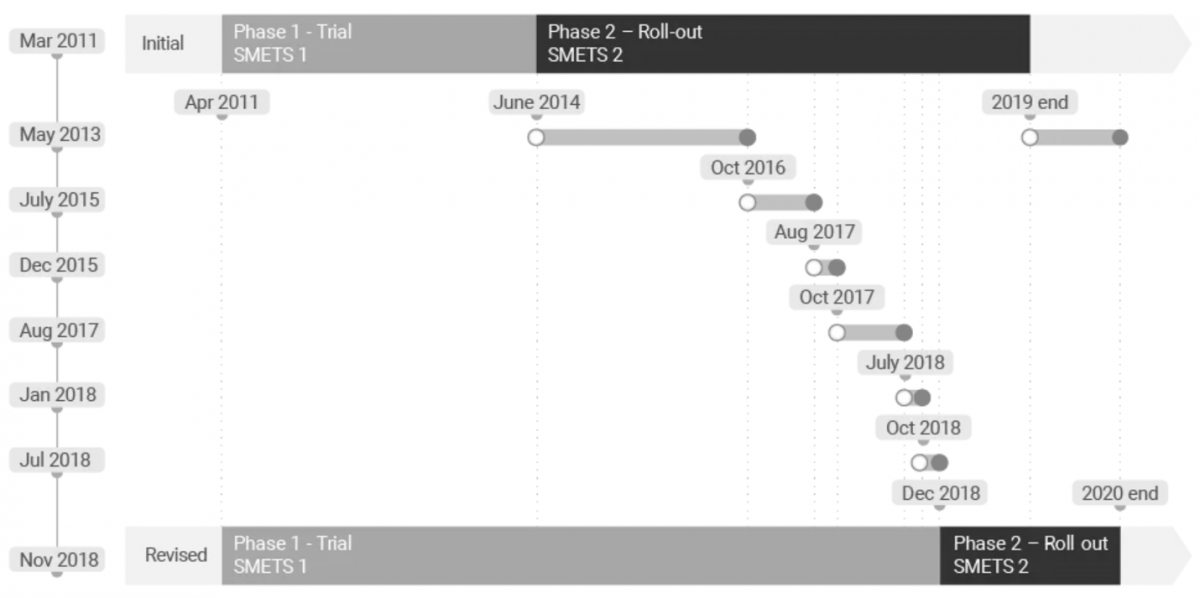Geopolitical Risks in Technology Supply Chain

The GB Smart Meter programme has been in the news recently for the wrong reasons. The National Audit Office has concluded that delivering 53 million smart meters by the end of 2020 is unattainable. The cross-party British Infrastructure Group of Parliamentarians made a similar warning last july.

Ever since the Government made the decision to proceed with smart meter deployment in December 2009, the programme has been beset by problems. Difficulties with its communication system, meter technical specification and technology development have all caused major delays. We can see from the chart below how the deadlines have been pushed back on numerous occasions.

Initial and revised schedule for smart meters rollout in GB, showing the numerous deadline updates.
At the end of September 2018, out of 53 million, about 38 million traditional meters were still waiting to be replaced. It is also very likely that many of the 14.7 million meters already deployed (93% of which, i.e. 13.64 million, in domestic properties) will have to be changed because of interoperability problems.
To achieve this target, suppliers would need to install more than 300,000 meters a week from now on and for two years, while they are said to be currently rolling out less than a third of this amount.
The chart below shows the pace of deployment for the GB programme to meet its targets.

Smart meters deployment in domestic properties from Q4 2012 to Q3 2018 and projection to reach the 2020 target of around 50m meters
It is worth comparing this performance to the French electricity smart meter programme, known as Linky. As we can see from the comparison below, France and GB both need to roll out an average of 6 million meters per year over the length of their respective programmes. However, Linky has completed over 98% of its intermediary objectives to date, with a deployment pace currently at 150,000 meters a week, expected to peak at 175,000 in 2019 and 2020.
France is also showing the way of delivering smart meters in terms of costs as it seems to be well on track for completing Linky not only in time but within its budget of only €5bn.
This is less than half the £11bn planned by the government for GB, which will be hit by an increase of at least £0.5bn, and potentially much more, according to the NAO.

Comparison of the British and French smart meter programmes
For GB, even a 2023 roll-out completion date is now looking optimistic. There are several reasons for this superior performance in the French programme:
The GB programme is now way over time and over budget. Many of the already installed smart meters will need to be replaced. We must stop now and take the time to think things through.
The fundamental mistake was to make this a supplier led programme. There is a reason why the vast majority of smart meter programmes across the world are led by distribution networks. Network companies manage whole license areas, so it makes it easier for deployment. There is no need to obtain agreement on functionality and technology from numerous suppliers with different agendas, each trying to derive an advantage.
Further, most of the benefit of smart meters is achieved at the distribution level through better load management. This will be increasingly the case with more localised and decentralised generation and battery storage, enhancing the role of the distribution system operator.
The programme in its current state is not going to achieve its objectives and there will be many in government at the moment who know this is the case. In an ideal world we would stop the programme now and start again with a distribution led programme. Given the sunk costs it is probably too late now and the politics of such a u-turn would be disastrous.
However, it would not hurt to pause the GB smart meter programme and assess how it is that the French have been so successful in delivering Linky. Then start again with clearer rules, a more realistic plan and potentially less complicated technology.
If you need help with industrial changes, Sia Partners can help. We are technical experts with a deep understanding of asset management, markets, and trading, smart meter programme management, modelling, and regulation. Learn more about our services in the Energy & Utilities Sector.